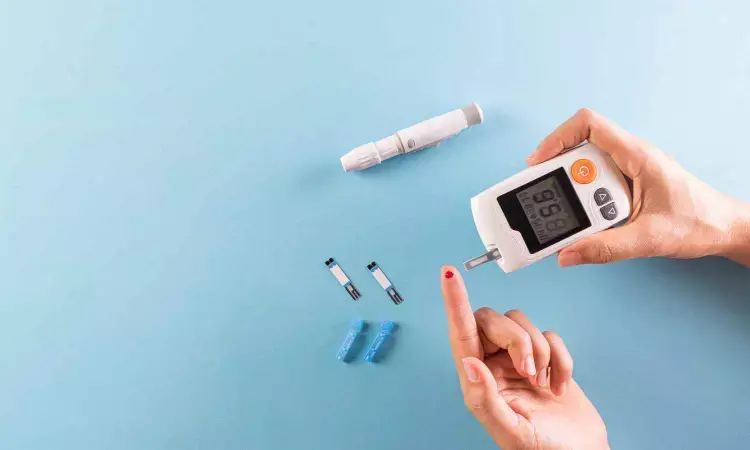- Home
- Medical news & Guidelines
- Anesthesiology
- Cardiology and CTVS
- Critical Care
- Dentistry
- Dermatology
- Diabetes and Endocrinology
- ENT
- Gastroenterology
- Medicine
- Nephrology
- Neurology
- Obstretics-Gynaecology
- Oncology
- Ophthalmology
- Orthopaedics
- Pediatrics-Neonatology
- Psychiatry
- Pulmonology
- Radiology
- Surgery
- Urology
- Laboratory Medicine
- Diet
- Nursing
- Paramedical
- Physiotherapy
- Health news
- Fact Check
- Bone Health Fact Check
- Brain Health Fact Check
- Cancer Related Fact Check
- Child Care Fact Check
- Dental and oral health fact check
- Diabetes and metabolic health fact check
- Diet and Nutrition Fact Check
- Eye and ENT Care Fact Check
- Fitness fact check
- Gut health fact check
- Heart health fact check
- Kidney health fact check
- Medical education fact check
- Men's health fact check
- Respiratory fact check
- Skin and hair care fact check
- Vaccine and Immunization fact check
- Women's health fact check
- AYUSH
- State News
- Andaman and Nicobar Islands
- Andhra Pradesh
- Arunachal Pradesh
- Assam
- Bihar
- Chandigarh
- Chattisgarh
- Dadra and Nagar Haveli
- Daman and Diu
- Delhi
- Goa
- Gujarat
- Haryana
- Himachal Pradesh
- Jammu & Kashmir
- Jharkhand
- Karnataka
- Kerala
- Ladakh
- Lakshadweep
- Madhya Pradesh
- Maharashtra
- Manipur
- Meghalaya
- Mizoram
- Nagaland
- Odisha
- Puducherry
- Punjab
- Rajasthan
- Sikkim
- Tamil Nadu
- Telangana
- Tripura
- Uttar Pradesh
- Uttrakhand
- West Bengal
- Medical Education
- Industry
Salivary Glycated Albumin simple and reliable method for evaluating glycemic control, suggests study

Japan: Recent research published in Diabetes Research and Clinical Practice suggests that salivary glycated albumin (GA) may serve as a reliable marker for glycemic control, comparable to traditional blood glycated albumin measurements in individuals with diabetes. This innovative approach could potentially transform diabetes management, making it more accessible and less invasive.
This exploratory research demonstrated that salivary GA levels measured by this method were accurate and could potentially replace traditional blood GA measurements.
"The development of a home-based salivary GA testing system is anticipated, which may alleviate the burden and complications faced by individuals with diabetes mellitus, ultimately enhancing their quality of life," the researchers wrote.
Monitoring diabetes-related biomarkers is essential for evaluating glycemic control. Traditional methods such as finger-prick blood glucose tests, HbA1c measurements, and blood glycated albumin assessments are invasive. To address this, Naoto Kubota, Department of Diabetes and Metabolic Diseases, Graduate School of Medicine, The University of Tokyo, Tokyo, Japan, and colleagues developed a non-invasive technique for measuring salivary GA with high accuracy using high-performance liquid chromatography (HPLC).
For this purpose, the researchers recruited participants with diabetes mellitus who were admitted to The University of Tokyo Hospital. Blood and saliva samples were collected at three-time points: fasting and 2 hours postprandial at admission, and fasting at discharge. Following partial purification with an antibody-based column, the samples underwent glycated albumin (GA) measurement using the high-performance liquid chromatography (HPLC) method.
The study led to the following findings:
- Among the 56 participants with diabetes mellitus enrolled in the study, there was a strong correlation between glycated albumin levels measured in blood and saliva across the three specified time points.
- The analysis showed an R² value of 0.985 (n=45) at fasting, 0.973 (n=48) at 2 hours postprandial, and 0.979 (n=51) at fasting upon discharge.
- Multiple regression analysis indicated these associations remained significant even after adjusting for age, body mass index (BMI), and nephropathy stage.
In conclusion, the findings indicate that salivary glycated albumin levels measured in fasting and postprandial samples obtained at admission, and fasting samples taken at discharge, exhibited a strong correlation with blood GA levels measured at the same time points. Notably, these correlations remained significant even after adjusting for age, BMI, and the stage of diabetic nephropathy. The study successfully developed and employed a novel method for measuring salivary GA levels.
"Therefore, salivary glycated albumin has the potential to serve as a simple and reliable method for evaluating glycemic control," the researchers wrote.
Reference:
Aihara, M., Yano, K., Irie, T., Nishi, M., Yachiku, K., Minoura, I., Sekimizu, K., Sakurai, Y., Kadowaki, T., Yamauchi, T., & Kubota, N. (2024). Salivary glycated albumin could be as reliable a marker of glycemic control as blood glycated albumin in people with diabetes. Diabetes Research and Clinical Practice, 111903. https://doi.org/10.1016/j.diabres.2024.111903
Dr Kamal Kant Kohli-MBBS, DTCD- a chest specialist with more than 30 years of practice and a flair for writing clinical articles, Dr Kamal Kant Kohli joined Medical Dialogues as a Chief Editor of Medical News. Besides writing articles, as an editor, he proofreads and verifies all the medical content published on Medical Dialogues including those coming from journals, studies,medical conferences,guidelines etc. Email: drkohli@medicaldialogues.in. Contact no. 011-43720751


